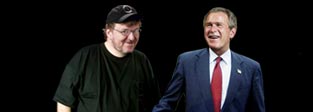STAY TUNED THIS WEEKEND! I'll be blogging daily at and around the Democratic National Convention, including throughout this weekend, so if you're not an e-mail subscriber to Media Log, please check in frequently. I'm going to try to take a camera to some events and post those as well.
Also, the Phoenix staff will be posting reports all week here.
NO MORE MUSH FOR THE MUDDLED. Consider the Undecided Voter. He or she is a sorry specimen. Though surely there are some undecideds who are knowledgeable about and interested in politics, the general rule is that our U.V. is disconnected, unaware, bored, and will, in the end, choose on the basis of John Kerry's hair, or George W. Bush's smirk.
The quest for the U.V. is why presidential candidates generally say so little that matters. Look at the 2000 race, a time when - if you listened to the campaign rhetoric - it appeared that the most important issue on the face of the earth was whether senior citizens could afford their prescription drugs. Now, this is not an issue without importance. Still, it was perfectly obviously that Bush's and Al Gore's handlers had decided this was the best way of appealing to that narrow sliver of undecided voters without alienating anyone who had already decided to support them. It wasn't pretty.
But things may be different this time. The Boston Globe's Anne Kornblut and Susan Milligan reported recently on the Bush phenomenon of catering to the conservative base in hopes of driving up turnout. They quoted anti-tax activist Grover Norquist as saying, "Forty-five percent of the country is for Bush, forty-five percent of the country is for Kerry. How much time do you spend trying to talk to the 10 percent in the middle who don't know what they think?"
The conventional wisdom is that this opens up some room for Kerry in the middle, and perhaps it does. But what if Norquist's 45-45 figure is actually too low? What if it's more like 48-48, with four percent undecided (with a point or two for Ralph Nader)?
That may indeed be the case. Last night, I attended an event at the Mary Baker Eddy Library in which three Christian Science Monitor journalists - White House reporter Linda Feldmann, political reporter Liz Marlantes, and editor Paul Van Slambrouck, who moderated - kicked it around. What struck me about Feldmann's and Marlantes's observations was that, in 2004, almost no one is undecided.
Unlike 2000, this is seen as an important race about vital issues. "In this election, it seems that everything is on the table," said Feldmann - war, terrorism, foreign relations, the economy, and lesser but highly polarizing issues such as same-sex marriage and Supreme Court appointments. As a result, she noted, a recent poll showed that the level of voter engagement is already the same as it was in October 2000, just before that election.
"There are precious few undecided voters out there," said Marlantes. She observed that she recently interviewed potential voters in Pennsylvania, one of about 17 swing states, and found that "people are very, very sure which way they're going to vote."
At that point, Van Slambrouck asked for a show of hands from the several hundred people in the audience. Who, he asked, is undecided? Maybe three hands went up.
Which raises an interesting possibility for the Kerry campaign. Whether you support Kerry or not, you have to concede that his greatest difficulty as a politician is his reluctance to take clear, decisive stands on issues. Partly this is admirable - we live in a world of nuance and grays, and someone who understands that would be an obvious improvement over what we've got now. But Kerry takes it to a new level. As Marlantes observed, when it comes to specific issues, Kerry may not be any more of a flip-flopper than Bush. (Remember compassionate conservatism? The faith-based initiative? The promise to stay away from nation-building?) But Kerry, she said, has the "personality" of someone who doesn't come off as particularly decisive.
But if there more votes to be gotten by appealing to the Democratic base rather than pandering to the U.V.s in the middle, Kerry has an opportunity to articulate a clear vision of what he wants to do with the presidency should he win it.
It will start with the Democratic National Convention. I asked Marlantes and Feldmann what they think Kerry most needs to get out of the event. Their answers fit well with the drive-up-your base scenario. Marlantes said Kerry needs to introduce himself to the country - even to those who already say they support him, noting that, to an unprecedented degree, the public is choosing on the basis of party affiliation rather than person. "A lot of voters still say they don't know very much about John Kerry," Marlantes said. Added Feldmann: "This convention is essentially a big pep rally. They want Democrats to get excited."
What this could add up to is something very different from- and potentially better than - the mush to which we've been subjected in recent years. In honor of Dick Morris, call it the End of Triangulation.
WHAT IF THE U.S. WERE MORE LIKE MASSACHUSETTS? There were would be more cops and less crime. There would be higher taxes, but much higher incomes. There would be more bipartisanship and ticket-splitting. The country would be more liberal, but not by as much as out-of-staters might think.
Something for Democratic National Convention delegates to ponder in the latest CommonWealth magazine.
TECH UPDATE. The celebrating was premature, but now it's official: I managed to get Claris Home Page back onto my iBook, so the formatting problems of the past week should be history.


